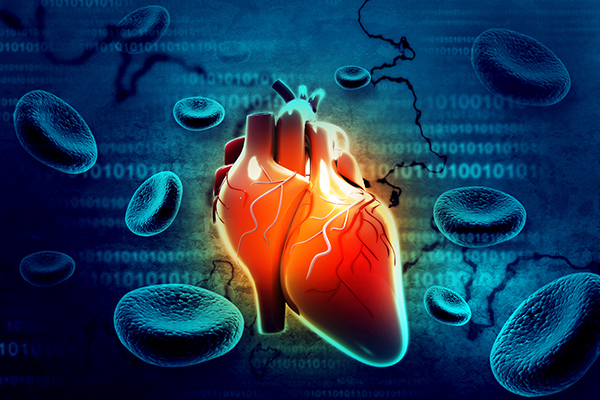Modified Citrus Pectin
Modified citrus pectin (MCP) is a lesser-known natural substance that has been used for years by naturopathic doctors as an adjunct to cancer treatment, but is also of interest for its gentle chelating effects as well as possible effects in the area of cardiovascular disease. This article reviews the uses of this unique substance.
MCP is a low-molecular-weight form of citrus pectin that has been structurally modified to a specific molecular weight, which allows it to be absorbed into circulation and thereby exert therapeutic properties in the body.[1][2] Regular (unmodified) citrus pectin, derived from the pith of citrus fruit, has a molecular weight of about 50–300 kilodaltons, and this characteristic renders regular pectin far too large to enter the bloodstream. Conversely, modified citrus pectin has a molecular weight of 3–13 kilodaltons and can easily enter the circulation.
Cancer
Galectin-3 is a lectin belonging to the beta-galactoside-binding protein family. Galectin-3 is present in most adult tissue types; however, it is overexpressed by cancer cells and is present in increased levels in the tumour microenvironment (TME).[3] According to Wang: “galectins play an essential role in the origin and development of cancer, such as angiogenesis, cell adhesion, invasion, and migration.”[4] Furthermore, galectin-3 has been shown to exert immunosuppressive effects in the tumour microenvironment, thereby facilitating cancer growth.[3]
Research on galectin-3 in various cancer types shows that galectin-3 is implicated in the following: helps breast cancer cells evade immune surveillance and destruction by T-cells; increases resistance of uterine cancer cells to chemotherapy; enhances gastric cell mobility and enhances metastasis; increases growth, progression, angiogenesis, and metastasis of melanoma cells; and increases progression of glioma (brain cancer).[3]
Since galectin-3 is a beta-galactoside-binding protein, and MCP is rich in beta-galactose, MCP has the ability to bind galectin-3, blocking galectin-3’s harmful effects.[5] In experimental models, supplementation with MCP has been show to achieve the following:
- Sensitize prostate cancer cells to chemotherapy agents (cisplatin) in vitro.[6]
- Induce apoptosis in androgen-dependent and independent prostate cancer cells in vitro.[7]
- Activate T-cytotoxic cells, B-cells, and NK cells in chronic myeloid leukemia cells in vitro.[8]
- Synergistic cytotoxic effects with paclitaxel (chemotherapy) in ovarian cancer cells.[9]
- Induce apoptosis in lung cancer cell lines.[10]
In a Phase II trial, MCP supplementation was shown to increase the PSA doubling time (PSADT) in 13 men with prostate cancer and who had biochemical prostate-specific antigen (PSA) failure after localized treatment—that is, radical prostatectomy, radiation, or cryosurgery.[11] This means that despite surgery and radiation therapy, these men were experiencing rising PSA levels predictive of prostate-cancer recurrence. In these men, the time to a doubling of their PSA levels increased significantly in 70% of the men after taking MCP for 12 months, compared to before taking MCP. This means that MCP postpones the potential cancer recurrence.
Many naturopathic doctors trained in treating cancer also report using MCP before and after cancer surgery to reduce the risk of metastasis (cancer spread).[12]
Chronic Inflammatory Disease
 There is ample evidence for galectin-3 not only affecting cancer development, but also having a role in other chronic inflammatory disease. The role of galectin-3 in cardiovascular disease is probably the best-elucidated, where it has been implicated in cardiovascular remodeling and fibrosis.[13] In fact, galectin-3 has been approved as a prognostic test in chronic heart failure, with elevated galectin-3 levels predicting increased risk of death.[1] Since then, galectin-3 has been associated with several other cardiovascular conditions such as aneurysm, aortic stenosis, etc.[14][15] In a paper by Martinez et al, researchers reported that “obesity upregulates Gal-3 production in the cardiovascular system,” and that “Gal-3 inhibition with modified citrus pectin (100 mg/kg per day) reduced cardiovascular levels of Gal-3, total collagen, collagen I, transforming and connective growth factors, osteopontin, and monocyte chemoattractant protein-1 in the heart and aorta of obese animals without changes in body weight or blood pressure.”[13] In other words, supplementation of animals with MCP reduced markers of inflammation, cardiac remodeling, and fibrosis associated with obesity.
There is ample evidence for galectin-3 not only affecting cancer development, but also having a role in other chronic inflammatory disease. The role of galectin-3 in cardiovascular disease is probably the best-elucidated, where it has been implicated in cardiovascular remodeling and fibrosis.[13] In fact, galectin-3 has been approved as a prognostic test in chronic heart failure, with elevated galectin-3 levels predicting increased risk of death.[1] Since then, galectin-3 has been associated with several other cardiovascular conditions such as aneurysm, aortic stenosis, etc.[14][15] In a paper by Martinez et al, researchers reported that “obesity upregulates Gal-3 production in the cardiovascular system,” and that “Gal-3 inhibition with modified citrus pectin (100 mg/kg per day) reduced cardiovascular levels of Gal-3, total collagen, collagen I, transforming and connective growth factors, osteopontin, and monocyte chemoattractant protein-1 in the heart and aorta of obese animals without changes in body weight or blood pressure.”[13] In other words, supplementation of animals with MCP reduced markers of inflammation, cardiac remodeling, and fibrosis associated with obesity.
Heavy Metal Chelation
Finally, MCP has been shown to have activity as a gentle chelator of heavy metals. One pilot study of otherwise healthy patients demonstrated that ingestion of 5 g MCP three times daily for five days and 20 g on the sixth day resulted in an increase in heavy metal excretion through urine.[2]
After MCP ingestion, urine testing demonstrated a 130% increased excretion of arsenic, 150% increased excretion of cadmium, and 560% increased excretion of lead. This was in patients with “normal” body stores of heavy metals, defined as being otherwise asymptomatic and without other evidence of increased body burden. These authors suggested that the “systemic chelation of toxic metals by MCP may in part be attributable to the presence of rhamnogalacturonan II, which has been shown previously to chelate metals.”[2]
Another report, by Zhou et al, described chelation of children with lead poisoning using MCP.[16] In this study, seven hospitalized children with a blood lead level greater than 20 µg/dL and who had not received any form of chelating and/or detoxification medication for three months prior were given 15 g of MCP (PectaSol-C®) in three divided dosages a day. After 28 days, blood testing showed a “dramatic decrease in blood serum levels of lead,”[16] with a 161% average decrease, and a concomitant increase in 24-hour urine lead level, reflecting increased excretion.
In conclusion, MCP is a natural substance with a number of intriguing activities, including antimetastatic effects in cancer models; chelating effects with respect to lead, arsenic, and cadmium, and possibly other heavy metals; as well as potentially offsetting some of the cardiac remodelling and risk of heart disease induced by obesity.
References
- Eliaz, I., and H. Fritz. “Galectin-3: An emerging target and role of MCP.” Integrated Healthcare Practitioners (Sept 2012): 52–57.
- Eliaz, I., et al. “The effect of modified citrus pectin on urinary excretion of toxic elements.” Phytotherapy Research, Vol. 20, No. 10 (2006): 859–864.
- Farhad, M., A.S. Rolig, and W.L. Redmond. “The role of Galectin-3 in modulating tumor growth and immunosuppression within the tumor microenvironment.” Oncoimmunology, Vol. 7, No. 6 (2018): e1434467.
- Wang, L., et al. “The role of galectins in cervical cancer biology and progression.” BioMed Research International, Vol. 2018 (2018): 2175927.
- Nangia-Makker, P., et al. “Carbohydrate-binding proteins in cancer, and their ligands as therapeutic agents.” Trends in Molecular Medicine, Vol. 8, No. 4 (2002): 187–192.
- Wang, Y., et al. “Calpain activation through galectin-3 inhibition sensitizes prostate cancer cells to cisplatin treatment.” Cell Death & Disease, Vol. 1 (2010): e101.
- Yan, J., and A. Katz. “PectaSol-C modified citrus pectin induces apoptosis and inhibition of proliferation in human and mouse androgen-dependent and-independent prostate cancer cells.” Integrative Cancer Therapies, Vol. 9, No. 2 (2010): 197–203.
- Ramachandran, C., et al. “Activation of human T-helper/inducer cell, T-cytotoxic cell, B-cell, and natural killer (NK)-cells and induction of natural killer cell activity against K562 chronic myeloid leukemia cells with modified citrus pectin.” BMC Complementary and Alternative Medicine, Vol. 11 (2011): 59.
- Hossein, G., et al. “Synergistic effects of PectaSol-C modified citrus pectin an inhibitor of Galectin-3 and paclitaxel on apoptosis of human SKOV-3 ovarian cancer cells.” Asian Pacific Journal of Cancer Prevention, Vol. 14, No. 12 (2013): 7561–7568.
- Leclere, L., et al. “Heat-modified citrus pectin induces apoptosis-like cell death and autophagy in HepG2 and A549 cancer cells.” PLoS One, Vol. 10, No. 3 (2015): e0115831.
- Guess, B.W., et al. “Modified citrus pectin (MCP) increases the prostate-specific antigen doubling time in men with prostate cancer: A phase II pilot study.” Prostate Cancer and Prostatic Diseases, Vol. 6, No. 4 (2003): 301–304.
- Seely, D., et al. “Naturopathic oncology care for thoracic cancers: A practice survey.” Integrative Cancer Therapies, Vol. 2018 (2018): 1534735418759420.
- Martínez-Martínez, E., et al. “Galectin-3 participates in cardiovascular remodeling associated with obesity.” Hypertension, Vol. 66, No. 5 (2015): 961–969.
- Fernandez-García, C.E., et al. “Increased galectin-3 levels are associated with abdominal aortic aneurysm progression and inhibition of galectin-3 decreases elastase-induced AAA development.” Clinical Sciences, Vol. 131, No. 22 (2017): 2707–2719.
- Sádaba, J.R., et al. “Role for galectin-3 in calcific aortic valve stenosis.” Journal of the American Heart Association, Vol. 5, No. 11 (2016): e004360.
- Zhao, Z.Y., et al. “The role of modified citrus pectin as an effective chelator of lead in children hospitalized with toxic lead levels.” Alternative Therapies in Health and Medicine, Vol. 14, No. 4 (2008): 34–38. Erratum in: Alternative Therapies in Health and Medicine, Vol. 14, No. 6 (2008): 18.

 Stores
Stores
 Dr. Heidi Fritz, MA, ND
Dr. Heidi Fritz, MA, ND
